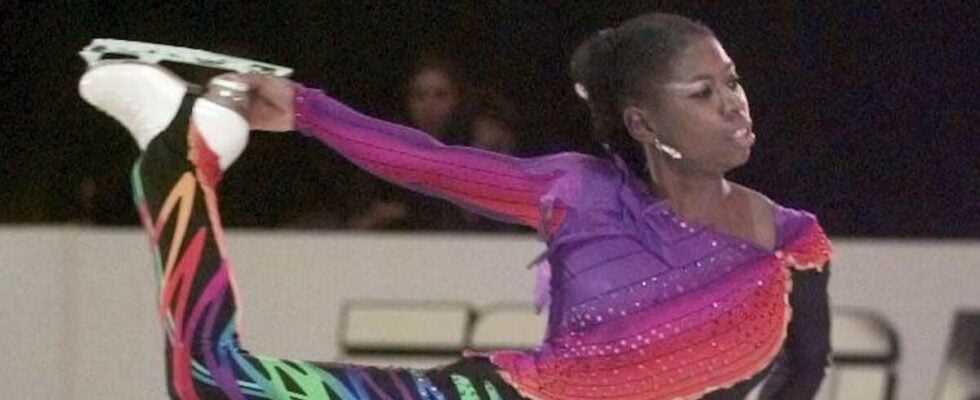The distribution of the documentary Blacks in France this Tuesday on France 2 brought back painful memories for some French people, like Surya Bonaly’s silver medal at the 1994 world figure skating championships.
This January 18, France 2 broadcast an unpublished documentary as a bonus, followed by a debate moderated by Julian Bugier: Blacks in France. A passage from this production particularly touched Internet users and viewers and concerns a sportswoman well known and loved by the French, even if she has moved away from the podiums: Surya Bonaly. Commented by the multi-award-winning writer Alain Mabanckou, this choral documentary gave the floor to several celebrities such as Jean-Pascal Zadi, Karine Baste-Régis, Yannick Noah or Soprano to testify to their experiences as well as to people unknown to the general public who have at heart to change things despite a society that is struggling to move forward and give them a chance. And all of them were marked by the story of the figure skater.
The racism behind his silver medal?
Among them, a young woman, Kathy Laurent Pourcel, aspiring to become a ballet dancer at the opera. While she was explaining how difficult it was to find your place in an environment that considers itself only capable of welcoming people of white color, she returned to an episode in contemporary history that marked the spirits. During the 1994 world championships in Japan, her performance was such that she – and her entire team – was convinced to get the gold medal. His Japanese competitor who succeeds him offers a good performance but technically inferior. However, it is the latter that takes first place. The French skater is therefore angry with the judges and shows up at the medal ceremony late and crying after declaring: “I did everything I could, but I didn’t paint myself white, that’s for sure”.
Strong reactions
If Surya Bonaly lives today far from the French media sphere, in the United States where she became a trainer, her experience marked a whole generation of people who experienced the same discrimination as her, which we realize thanks to the testimonials from the guests of the documentary. And the broadcast of this documentary allowed others to understand and feel empathy for this young athlete who felt she had been victim of injustice. On Twitter, nshadowy were the reactions after the broadcast of this particular passage. So much so that on January 19, the day after the passage of the documentary, “Surya Bonaly” remains in top tweet, that is to say one of the most commented subjects on the social network. Through their messages, Internet users, touched, have in a way paid tribute to the sportswoman. This will soon be the subject of a biopic in the form of a mini-series.
I was 13 and I remember it like it was yesterday. Misunderstanding, but we all understood, she first. The tears swallowed in front of the crying injustice.. queen of the ice. She surpassed all her peers. Back flip queen. Surya Bonaly. ❤️ #BlacksInFrance pic.twitter.com/YYHBYDGC8A
— Stubborn Ant (@AmaZyre) January 18, 2022
Surya Bonaly, I was too young to understand her tears…I now understand all the horror behind
#BlacksInFrance pic.twitter.com/hUFNSd8CTd
— Gaia (@yabs_mr) January 18, 2022
We were too young to understand…sorry Surya Bonaly ?#BlacksInFrance pic.twitter.com/cmRo4MWhn3
—Brownie Brownie (@BrownieBrowniie) January 18, 2022
Surya Bonaly everyone knew at the time that it was her skin color that prevented her from being world champion
#BlacksInFrance pic.twitter.com/JlPB98j29C— MALONE (@KARLMALONE86) January 18, 2022
I was a kid and I loved Surya Bonaly, I remember her tears but I was not aware at the time of what was behind it, all the injustice and racism she had to suffer .#BlacksInFrance pic.twitter.com/p4Pv9Ki4wN
— zouz’ ?? (@zouzoubchka) January 18, 2022
On the other hand, the Surya Bonaly affair is a lease that always pisses me off so much #BlacksInFrance
— ?? THE BEST ?? (@YokaKani) January 18, 2022
Surya Bonaly = Champion?.
These tears are devastating. pic.twitter.com/HtctQDOOUb
— Mehdi Omais (@MehdiOmais) January 18, 2022
Surya Bonaly’s tears are our tears of frustration, of all the injustice felt when we are discriminated against… It obviously resonates with us all.
— Gaia (@yabs_mr) January 18, 2022
